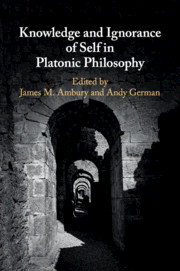Book contents
- Knowledge and Ignorance of Self in Platonic Philosophy
- Knowledge and Ignorance of Self in Platonic Philosophy
- Copyright page
- Contents
- Contributors
- Acknowledgments
- Abbreviations of Platonic Dialogues
- Introduction
- Chapter 1 Self-Knowledge and the Good
- Chapter 2 Two Faces of Platonic Self-Knowledge
- Chapter 3 Socratic Self-Knowledge and the Limits of Epistēmē
- Chapter 4 Socratic Wisdom and Platonic Knowledge in the Dialogues of Plato
- Chapter 5 Between Ascent and Descent*
- Chapter 6 Self-Knowledge and the Use of the Self in the Platonic Theages
- Chapter 7 Between Biography and Biology
- Chapter 8 A Toil-Loving Soul*
- Chapter 9 Mathematical Self-Ignorance and Sophistry
- Chapter 10 Why Is Knowledge of Ignorance Good?*
- Chapter 11 Self-Knowledge in Plato’s Symposium
- Chapter 12 Double Ignorance and the Perversion of Self-Knowledge
- Chapter 13 Philebus, Laws, and Self-Ignorance
- Bibliography
- Index of Names
- Index of Subjects
- Index of Passages
Chapter 9 - Mathematical Self-Ignorance and Sophistry
Theodorus and Protagoras
Published online by Cambridge University Press: 30 November 2018
- Knowledge and Ignorance of Self in Platonic Philosophy
- Knowledge and Ignorance of Self in Platonic Philosophy
- Copyright page
- Contents
- Contributors
- Acknowledgments
- Abbreviations of Platonic Dialogues
- Introduction
- Chapter 1 Self-Knowledge and the Good
- Chapter 2 Two Faces of Platonic Self-Knowledge
- Chapter 3 Socratic Self-Knowledge and the Limits of Epistēmē
- Chapter 4 Socratic Wisdom and Platonic Knowledge in the Dialogues of Plato
- Chapter 5 Between Ascent and Descent*
- Chapter 6 Self-Knowledge and the Use of the Self in the Platonic Theages
- Chapter 7 Between Biography and Biology
- Chapter 8 A Toil-Loving Soul*
- Chapter 9 Mathematical Self-Ignorance and Sophistry
- Chapter 10 Why Is Knowledge of Ignorance Good?*
- Chapter 11 Self-Knowledge in Plato’s Symposium
- Chapter 12 Double Ignorance and the Perversion of Self-Knowledge
- Chapter 13 Philebus, Laws, and Self-Ignorance
- Bibliography
- Index of Names
- Index of Subjects
- Index of Passages
Summary
- Type
- Chapter
- Information
- Knowledge and Ignorance of Self in Platonic Philosophy , pp. 151 - 168Publisher: Cambridge University PressPrint publication year: 2018



